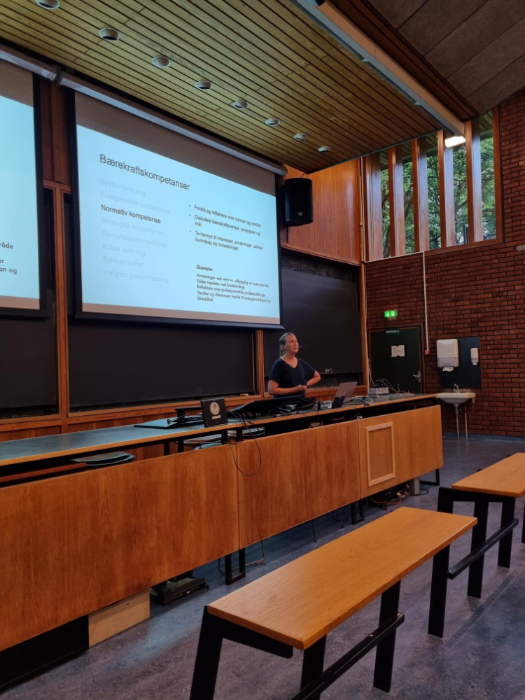This autumn's kick-off the teaching took place on 18th of August with the theme "teaching for sustainability". Due to illness, this year's event was somewhat reduced, but four successful workshops were held in Vilhelm Bjerkne's house. In other words, we met in person for the first time in two and a half years. It was good to be together again to talk about teaching.
Teaching for sustainability is a deliberate formulation, because we do not necessarily have to teach sustainability. Unesco writes:
Education for Sustainable Development (ESD) aims to develop competencies that enable and empower individuals to reflect on their own actions by taking into account their current and future social, cultural, economic and environmental impacts from both a local and a global perspective. It requires individuals to act in complex situations in a sustainable manner – to explore new ideas and approaches and participate in socio-political processes, with the objective of moving their societies progressively towards sustainable development. ESD, understood in this way aims to enable learners to take responsible actions that contribute towards creating sustainable societies now and in the future. It 'develops the skills, values and attitudes that enable citizens to lead healthy and fulfilled lives, make informed decisions, and respond to local and global challenges.
This is in line with UiO's strategy 2030. Furthermore, Unesco has defined eight sustainability competences in order to achieve an education as described above:
• Systems thinking competency
• Anticipatory competency
• Normative competency
• Strategic competency
• Collaboration competency
• Critical thinking competency
• Self-awareness competency
• Integrated problem-solving competence.
We at MN can recognize several of these skills as generic skills that we already integrate into our courses and our teaching. It is therefore not entirely foreign to us to use these skills as a framework for planning- and carrying out our teaching. Anja Røyne presented the eight sustainability competences (presentation, in Norwegian) and showed examples of how our courses can be linked to these competences.
integrate into our courses and our teaching. It is therefore not entirely foreign to us to use these skills as a framework for planning- and carrying out our teaching. Anja Røyne presented the eight sustainability competences (presentation, in Norwegian) and showed examples of how our courses can be linked to these competences.
In the first workshop - "A safe teaching environment for reflection and learning" (presentation, in Norwegian), Tone Gregers from KURT talked about how to create a learning environment where students thrive and want to be. Practicing collaboration skills requires that the students come to and want to be in the lessons. She placed particular emphasis on how we can use the first lecture in a course to set the framework for how we will spend the rest of the semester - both academically and socially.
In the second workshop - "Critical reading and targeted communication" (presentation, in Norwegian) Anja Røyne from KURT and Jessica Lönn-Stensrud from the university library emphasized how written submissions can be used to work with strategic competence and critical thinking. We often ask students to submit a report on a topic or work, but "report" is an ill-defined genre. Here we have an opportunity to train the students in more conscious communication and information gathering if we focus on the purpose of the assignment and who the report is aimed at (target group).
The third workshop – “What are we already doing? Sustainability in our teaching" (presentation, in Norwegian) was led by Anja Røyne and Tone Gregers. Here the participants worked with their own courses and used the framework for sustainability competences to identify what we already do in our teaching and how we communicate this to the students. The participants left the workshop having completed the sentence: "In my course we work with sustainability through...".
In the last workshop - "Science fiction as a reflection tool in teaching" (presentation, in Norwegian) Tone Gadmar and Heidi Konestabo from the university library emphasized the use of science fiction to train anticipatory competence. Films and books can form a unique opportunity to discuss what is possible and what is not possible in the future. At the same time, discussions and conversations related to books and films can help to put subjects in a larger and deeper context.
Reference:
Marco Rickmann (2018), Unesco:
